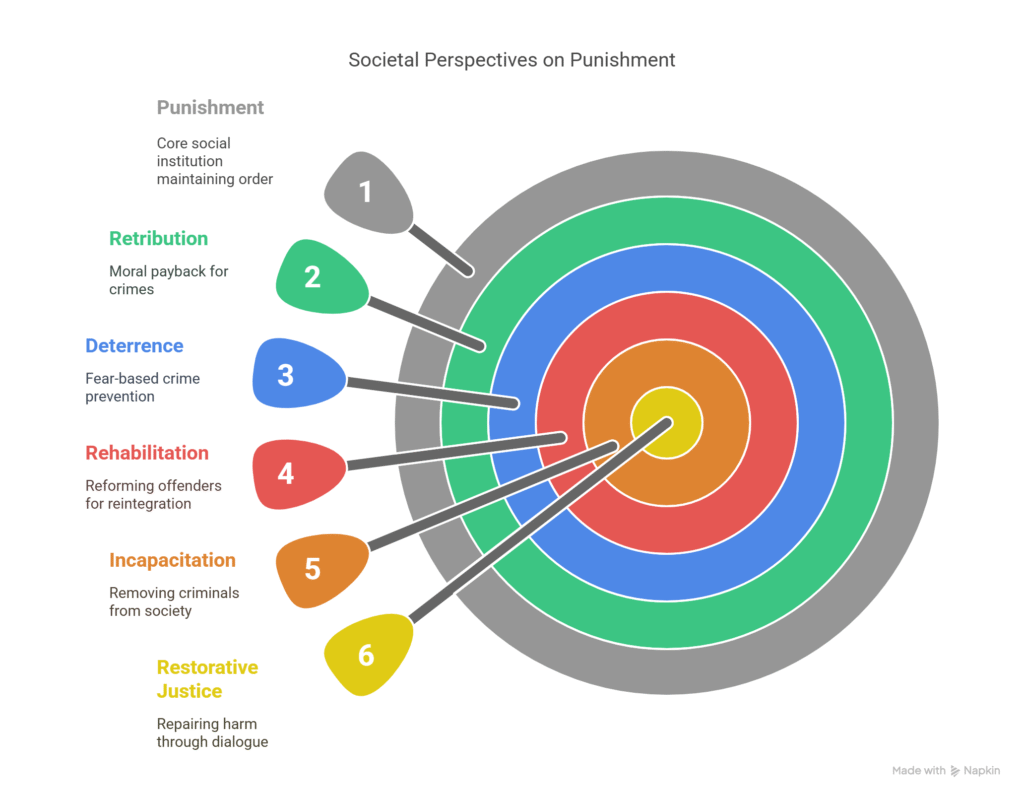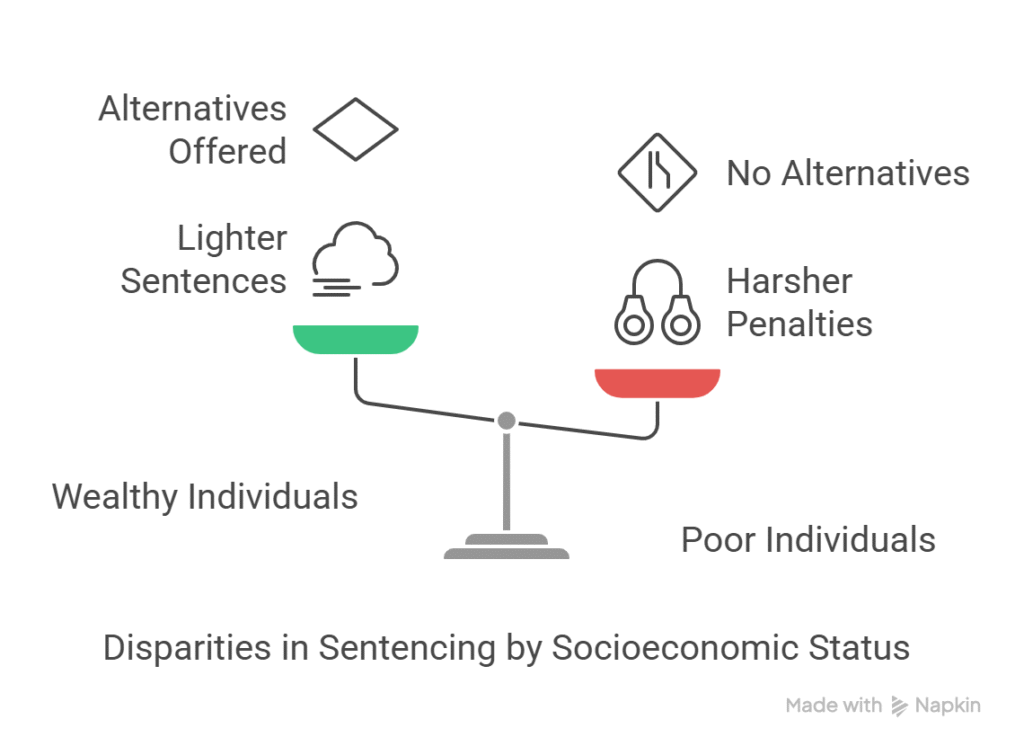Introduction
Punishment is a fundamental aspect of social control, serving as a mechanism to maintain order, enforce norms, and regulate behavior within society. Sociologists examine punishment not merely as a legal or moral response to crime but as a complex social institution shaped by historical, cultural, and political forces. Various philosophies of punishment—retribution, deterrence, rehabilitation, incapacitation, and restorative justice—reflect broader societal values and power structures. This article explores these philosophies from a sociological perspective, analyzing their implications for justice, social order, and inequality.

1. The Concept of Punishment in Sociology
Punishment is a societal occurrence intricately woven into the frameworks of power and authority. Émile Durkheim, one of the founding figures of sociology, argued that punishment serves a moral function by reinforcing collective norms and solidarity. In his view, the severity of punishment reflects the intensity of societal outrage rather than the objective harm caused by the crime.
Michel Foucault, in Discipline and Punish, offered a contrasting perspective, analyzing punishment as a mechanism of power and control. He traced the shift from brutal public executions in the pre-modern era to the modern prison system, arguing that contemporary punishment is more about surveillance and normalization than mere retribution.
From a sociological standpoint, punishment is not neutral; it is shaped by class, race, and gender dynamics, often reinforcing existing inequalities.
2. Major Philosophies of Punishment
A. Retribution
Retribution is one of the oldest philosophies of punishment, rooted in the idea of “just deserts”—offenders deserve to suffer in proportion to their crimes. The concept of lex talionis, which translates to ‘an eye for an eye’, serves as a prime illustration of this principle.
Sociological Analysis:
- Retribution reinforces moral boundaries by expressing societal condemnation.
- It may sustain cycles of violence instead of tackling the underlying causes of crime.
- Critics argue that retributive justice often reflects biases in law enforcement, with marginalized groups facing harsher punishments.
B. Deterrence
Deterrence theory posits that punishment discourages future crimes through fear of consequences. It operates on two levels:
- Specific deterrence—preventing the individual offender from reoffending.
- General deterrence—dissuading the broader public from criminal behavior.
Sociological Analysis:
- Research shows mixed effectiveness; severe punishments do not always reduce crime rates.
- The death penalty, often justified as a deterrent, has not been conclusively proven to lower homicide rates.
- Deterrence assumes rational decision-making, ignoring socioeconomic factors that drive crime.
C. Rehabilitation
Rehabilitation focuses on reforming offenders through education, therapy, and vocational training, aiming to reintegrate them into society.
Sociological Analysis:
- Demonstrates a more human-centered perspective, highlighting personal development.
- Criticized for being overly idealistic, as structural barriers (e.g., employment discrimination against ex-convicts) limit reintegration.
- The rise of mass incarceration has diminished rehabilitation efforts in favor of punitive measures.
D. Incapacitation
Incapacitation seeks to protect society by physically restricting offenders (e.g., imprisonment) to prevent further crimes.
Sociological Analysis:
- Justifies long prison sentences, contributing to overcrowding and high incarceration rates.
- Disproportionately affects poor and minority communities, exacerbating social inequality.
- Fails to address recidivism, as released prisoners often return to crime due to lack of support.
E. Restorative Justice
Restorative justice shifts focus from punishment to repairing harm by involving victims, offenders, and the community in reconciliation.
Sociological Analysis:
- Emphasizes healing and accountability rather than retribution.
- More effective in community-based settings but less applied in serious crimes.
- Challenges traditional punitive systems by prioritizing dialogue over incarceration.
3. Punishment and Social Inequality
Sociologists highlight how punishment reinforces social hierarchies:
- Class: Wealthy individuals receive lighter sentences or alternatives like fines, while the poor face harsher penalties.
- Race: Racial minorities, particularly Black and Latino populations, are overrepresented in prisons due to systemic biases in policing and sentencing.
- Gender: Women often receive different treatment in sentencing, with paternalistic attitudes leading to either leniency or harsher moral judgments.
Michelle Alexander’s The New Jim Crow argues that mass incarceration functions as a racial caste system, perpetuating discrimination under the guise of crime control.

4. The Prison Industrial Complex
The punishment system is increasingly influenced by economic and political interests:
- Private prisons profit from high incarceration rates, creating incentives for harsher sentencing.
- Prison labor exploits inmates as cheap workforce, raising ethical concerns.
- Law enforcement and judicial systems are funded based on arrest rates, not crime prevention.
5. Alternatives to Traditional Punishment
Given the flaws in punitive systems, sociologists advocate for alternatives:
- Decarceration: Reducing prison populations through sentencing reforms and parole.
- Community-Based Corrections: Probation, electronic monitoring, and rehabilitation programs.
- Abolitionist Movements: Some argue for dismantling prisons entirely, replacing them with restorative and transformative justice models.
Conclusion
Punishment is not merely a legal response to crime but a reflection of societal values, power structures, and inequalities. Sociological perspectives reveal how philosophies of punishment—whether retributive, deterrent, rehabilitative, or restorative—shape and are shaped by broader social forces. Moving forward, a critical examination of punitive systems is necessary to develop more just and equitable approaches to crime and justice. By addressing root causes such as poverty, racism, and lack of opportunity, society can move beyond punitive measures toward genuine social healing.

Topic Related Questions
5-Mark Questions (Short Answer)
- Define retribution as a philosophy of punishment.
- What is the main idea behind deterrence theory?
- How does rehabilitation differ from incapacitation?
- Explain Foucault’s view on modern punishment systems.
- What is restorative justice?
- How does Durkheim view the role of punishment in society?
- What is the prison industrial complex?
- How does class influence punishment in society?
- What are the two types of deterrence in criminal justice?
- Why is mass incarceration considered a sociological issue?
10-Mark Questions (Brief Essay/Detailed Response)
- Compare and contrast retribution and restorative justice as philosophies of punishment.
- Evaluate the effectiveness of deterrence in reducing crime rates.
- How does Michel Foucault’s Discipline and Punish explain the evolution of punish-ment?
- Discuss the role of rehabilitation in modern criminal justice systems.
- How does punish-ment reinforce social inequalities? Provide examples.
- Explain the concept of the prison industrial complex and its impact on society.
- Why do sociologists criticize mass incarceration?
- How does race influence sentencing and punish-ment in the criminal justice system?
- What are the alternatives to traditional imprisonment, and how effective are they?
- Discuss Durkheim’s perspective on punish-ment as a form of social solidarity.
15-Mark Questions (Long Essay/Critical Analysis)
- Critically analyze the five major philosophies of punish-ment (retribution, deterrence, rehabilitation, incapacitation, and restorative justice) from a sociological perspective.
- “Punish-ment’s is not just about crime control but also about maintaining social order and power.” Discuss this statement with reference to sociological theories.
- How does the criminal justice system perpetuate racial and class inequalities? Support your answer with sociological evidence.
- Evaluate the strengths and weaknesses of restorative justice as an alternative to traditional punitive systems.
- Examine Foucault’s argument that modern punishment is more about surveillance and control than justice.
- How has the shift from rehabilitation to retribution impacted modern prison systems?
- Discuss the ethical and social implications of the prison industrial complex.
- Should prisons be abolished? Present arguments for and against from a sociological perspective.
- How do gender biases influence punish-ments and sentencing in society?
- “Punish-ments reflects the values and power structures of society.” Critically discuss this statement with examples.
Like this this Post? You Can follow as on :-
Facebook – https://www.facebook.com/hubsociology
Whatsapp Channel – https://whatsapp.com/channel/0029Vb6D8vGKWEKpJpu5QP0O
Gmail – hubsociology@gmail.com

2 thoughts on “Philosophies of Punishment: A Sociological Perspective”